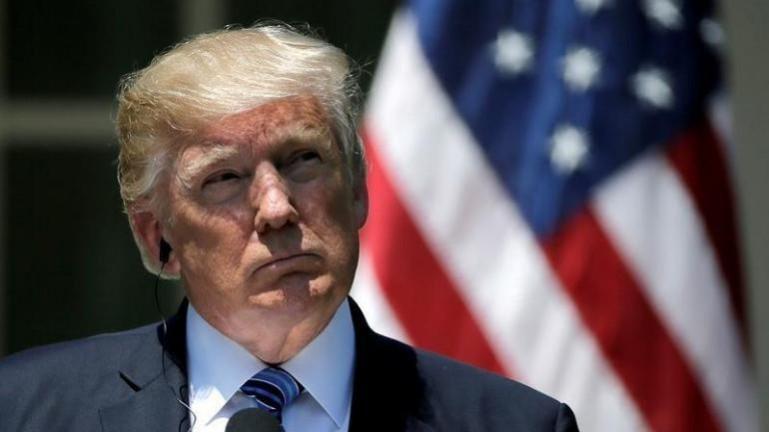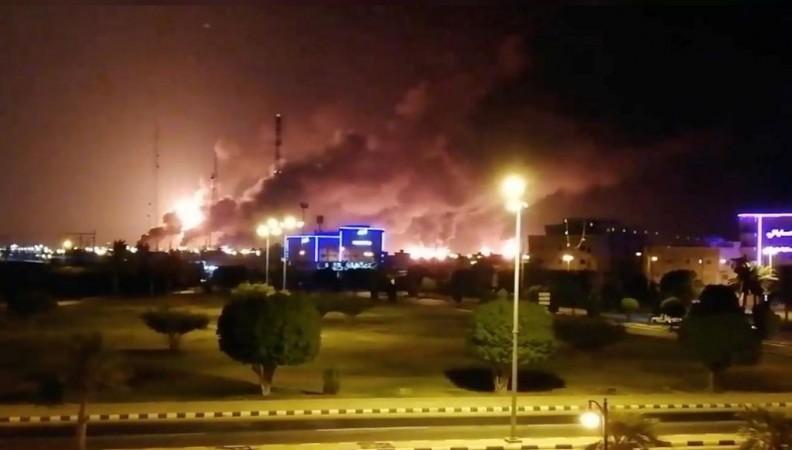
The Pentagon has been ordered to plan a strategic response to the attacks on Saudi Arabia's oil facilities, according to reports. The development came at a meeting attended by US President Donald Trump on Monday, official sources told CNN.
The report added that the United States is taking extreme care in its response to the issue. "No knee jerk reactions to this - it's very systematic - what happens with patience is it prevents stupid moves," sources said.
While the White House is waiting for a signal from Saudi officials before preparing further responses, US defence officials were instructed to plan potential options at the White House meeting on Monday. It was also revealed that no detailed strategic choices were presented at the meeting.
However, the White House is currently planning strategies against Iran as the administration feels "time is on its side to build a case against" the country, according to the CNN report.
The attacks on Saudi Arabia's state-owned Aramco oil facilities resulted in limiting its production to half of its potential. More than 5 percent of the global daily crude oil supply was lost due to the attacks. On Monday, global oil prices rose to their highest since the 1991 Gulf war.
The US Secretary of State, Mike Pompeo, is expected to travel to Jeddah to discuss the attacks with the Saudi crown prince, Mohammed bin Salman. According to reports, no response will be initiated, including a national security team meeting, till Pompeo returns.
Official sources have stated that any aggressive US military stance is unlikely to take place before next week's United Nations General Assembly, as officials will discuss plans to resolve the issue with world leaders.
Trump had asserted that the decision for appropriate response lies in the hands of Arab leaders and that the US is in no rush. "We have to sit down with the Saudis and work something out," Trump told reporters on Monday. "That was an attack on Saudi Arabia, and that wasn't an attack on us."
"We have a lot of options, but I'm not looking at options right now... We want to find definitively who did this. We're dealing with Saudi Arabia. ... We'll see what happens," he said.
The White House's careful response was condemned by South Carolina Senator Lindsey Graham, who has supported US strike against Iran. Recalling Iran forces shooting down an American drone in June, he stated that US' current measured response was a "sign of weakness".
Trump rebuffed Graham's claims and defended the diplomatic stance by stating that it signified strength, "that some people just don't understand".
No Lindsey, it was a sign of strength that some people just don’t understand! https://t.co/EU8AvfH7j9
— Donald J. Trump (@realDonaldTrump) September 18, 2019
While Trump's claims of non-aggressive approach echos statements made by the US Central Command who have said the US troops' posture has remained unchanged after the attacks, Vice President Mike Pence hinted towards US military readiness against the attacks.
"In the wake of this weekend's unprovoked attack on several oil facilities in Saudi Arabia, I promise you, we're ready. As the President said, we don't want war with anybody, but the United States is prepared -- we're locked and loaded," Pence said.

The US had claimed that it had evidence to prove that Iran was behind the Saudi attacks instead of Houthi rebels of Yemen, who claimed the responsibility. While Iran has denied the allegations, Trump claimed that US defence was "locked and loaded".
Saudi Arabia oil supply was attacked. There is reason to believe that we know the culprit, are locked and loaded depending on verification, but are waiting to hear from the Kingdom as to who they believe was the cause of this attack, and under what terms we would proceed!
— Donald J. Trump (@realDonaldTrump) September 15, 2019
No further talks
But while the UN General Assembly is seen as a perfect opportunity to have talks on conflict resolution between the two countries, Trump said he would prefer not to meet Iranian President Hassan Rouhani on the sidelines of the global meeting.
"I never rule anything out, but I prefer not meeting him," Trump said on Tuesday.
Iran's supreme leader Ayatollah Ali Khamenei also ruled out chances of any talks on Tuesday by stating that Iran will not have negotiations with the US.
"Iranian officials, at any level, will never talk to American officials ... this is part of their policy to put pressure on Iran ... their policy of maximum pressure will fail. All officials in Iran unanimously believe it," state media quoted Khamenei as saying.
Khamenei stated it will hold talks only if the US lifts its sanctions against Iran that were imposed since Trump left the nuclear deal in 2015.
"If America takes back its words and repents and returns to the nuclear deal, which they have violated, they can take part in the meetings of signatories to this agreement with Iran," Khamenei's official website stated. "Otherwise, no negotiation on any level will happen between officials of the Islamic Republic and America, neither in New York nor anywhere else."
Tweeting pictures of war-torn Yemen, Iran's Foreign Minister Javad Zarif stated that the US is in denial if it thinks that Yemen would not strike against Saudi Arabia for bringing millions at brink of starvation in the past four years.
US is in denial if it thinks that Yemeni victims of 4.5 yrs of the worst war crimes wouldn't do all to strike back.
— Javad Zarif (@JZarif) September 17, 2019
Perhaps it's embarrassed that $100s of blns of its arms didn't intercept Yemeni fire.
But blaming Iran won't change that.
Ending the war=only solution for all. pic.twitter.com/w1qUkdfw6M
The Yemen War
Saudi Arabia and Iran's conflict began during the outbreak of the Yemen war in 2015 after Saudi's Sunni Muslim-led coalition with the United Arab Emirates supported President Abdrabbuh Mansour Hadi. After the President was forced to flee the capital Sanaa by the Houthis, the Saudi government has led a coalition against Iran and launched strikes against the Houthis.
World Health Organisation (WHO) in September stated millions of people in Yemen are suffering from a severe shortage of food and medical care, affecting at least 2.5 million malnourished children who are without access to life-saving drugs due to the ongoing war.








